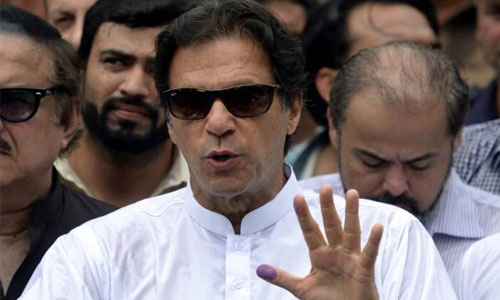Pakistani Prime Minister Imran Khan said in a surprise announcement that he would grand citizenship to Pakistan-born children of Afghan and Bengali refugees, many of whom have lived in the country for several decades. “Afghans whose children have been raised and born in Pakistan will be granted citizenship inshallah [God willing] because this is the established practice in countries around the world,” Khan said as quoted from Pakistani media. “They are humans. How come we have deprived them and have not arranged for offering them national identification card and passport for 30 years, 40 years?” He said that the identity crisis of thousands of Bengali and Afghan immigrants is pushing them to crime and thus the children’s lack of documentation and education has also prevented them from getting jobs and social rights.
Mr Khan made the announcement during a visit to city of Karachi, which has a large Afghan population and has also been plagued by gang violence. “Terrorism and target killing has declined in Karachi but there is a major reason behind the street crimes. It is an underclass. They are illiterate and jobless. They are the Bengalis and Afghans who are living in Pakistan, he said, adding that “These immigrants have lived here for decades, their children were born here, but they don’t have identity cards and passports,” he said. The people of this deprived class can’t get jobs without ID cards and passports, so our government has decided to issue them computerized national identity cards and passports, Khan said according to Pakistani media.
The United Nations has welcomed Imran Khan’s announcement. According to the United Nations refugee agency, Pakistan has had one the largest refugee population in the world, including roughly 2.7 million who went from Afghanistan. About 1.5 million would be affected by the announcement. They include the displaced families have who fled decades of conflict, ethnic and religious persecution, poverty and economic hardships in the country. There are also some 250,000 Bengalis, many of whom arrived during Pakistan’s civil war in 1971, when East Pakistan broke away to declare independence and become Bangladesh.
The fate of these refugees has had a long-running source of tension between Pakistan and Afghanistan. Islamabad believes it has borne the burden of millions of its neighbors for long enough and has repeatedly threatened mass repatriations. On the other hand, Afghans blamed Pakistan for using refugees as a political pressure against Kabul. There is also analysis that suggests as political motive for Khan’s move, saying the large number of Pashtuns who voted for Khan’s party as the refugees belong to the Pashtun ethnicity.
In fact, the history of these wondering refugee get back to many decades ago When the Soviets retreated from Afghanistan, a wave of voluntary repatriations took place but the conditions in post-Soviet Afghanistan were hardly conducive to their safe return. The early 1990s saw a constant state of civil war between the seven Mujahideen parties; this warfare ended in 1996 when the Taliban took over most Afghan territory. Despite a dramatic improvement in security for ordinary Afghans, the Taliban era was one of exceptional in terms of poverty and absence of economic opportunity. This meant that a second wave of repatriations in the late 1990s also was not successful as expected. Between 2001 and 2005, millions of Afghans returned home to the promise of stability and security in their homeland. Sadly, this third wave ended the same way the previous two had.
In 2016 a wave of forced repatriations sparked fears of a humanitarian crisis, with Human Rights Watch issuing a scathing report describing Pakistan’s “coercive” approach. It accused the government of arbitrary detentions and other violations. Eventually, this move was welcomed by human rights activists in Pakistan, who have called for Afghans born in the country to be given nationality in accordance with Pakistani law, which grants citizenship to anyone born in the country. So, it should be a happy news for millions of refugees who have faced police and bureaucratic harassment, and are often accused of harboring or encouraging militants and posing a security risk.
In recent years, when the relations between two neighbors have deteriorated they accused one and other for the issues. Kabul accused Islamabad of harboring Taliban militants who carry out attacks across the border but Pakistan denies the charge and blames Afghanistan for providing sanctuary to Pakistani Taliban militants responsible for attacks that have taken place on its soil. There were concerns that Islamabad planned to repatriate refugees back to Afghanistan after Pakistan extended the stay of Afghan refugees living within its borders by only 60 days.
On contrary to past, the move happened after some optimisms about new changes in policy of Pakistan. Few days ago the new Foreign Minister of Pakistan, Shah Mehmood Qureshi, traveled to Kabul and met with Afghanistan’s President Ashraf Ghani, Chief Executive Officer Abdullah Abdullah, and Acting Foreign Minister Salahuddin Rabbani. In their discussions they agreed to work on security and stability in the region, joint efforts against terrorism and the implementation of Afghanistan-Pakistan action plan. Showing their good-will, Pakistan offered thousands scholarships for Afghan students and Qureshi handed over a letter from Prime Minister Imran Khan, addressed to President Ghani, marking the first consignment of 40,000 tonnes of wheat gifted to the Afghan people. Considering these and Given the expressions released from the both parts, some of the local analysts hoped for opening a new constructive chapter of relation Kabul and Islamabad new administration.
Home » Opinion » Imran Khan Pledges to Grant Citizenship to Afghan Refugees
Imran Khan Pledges to Grant Citizenship to Afghan Refugees
| Mohammad Zahir Akbari

